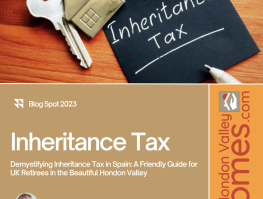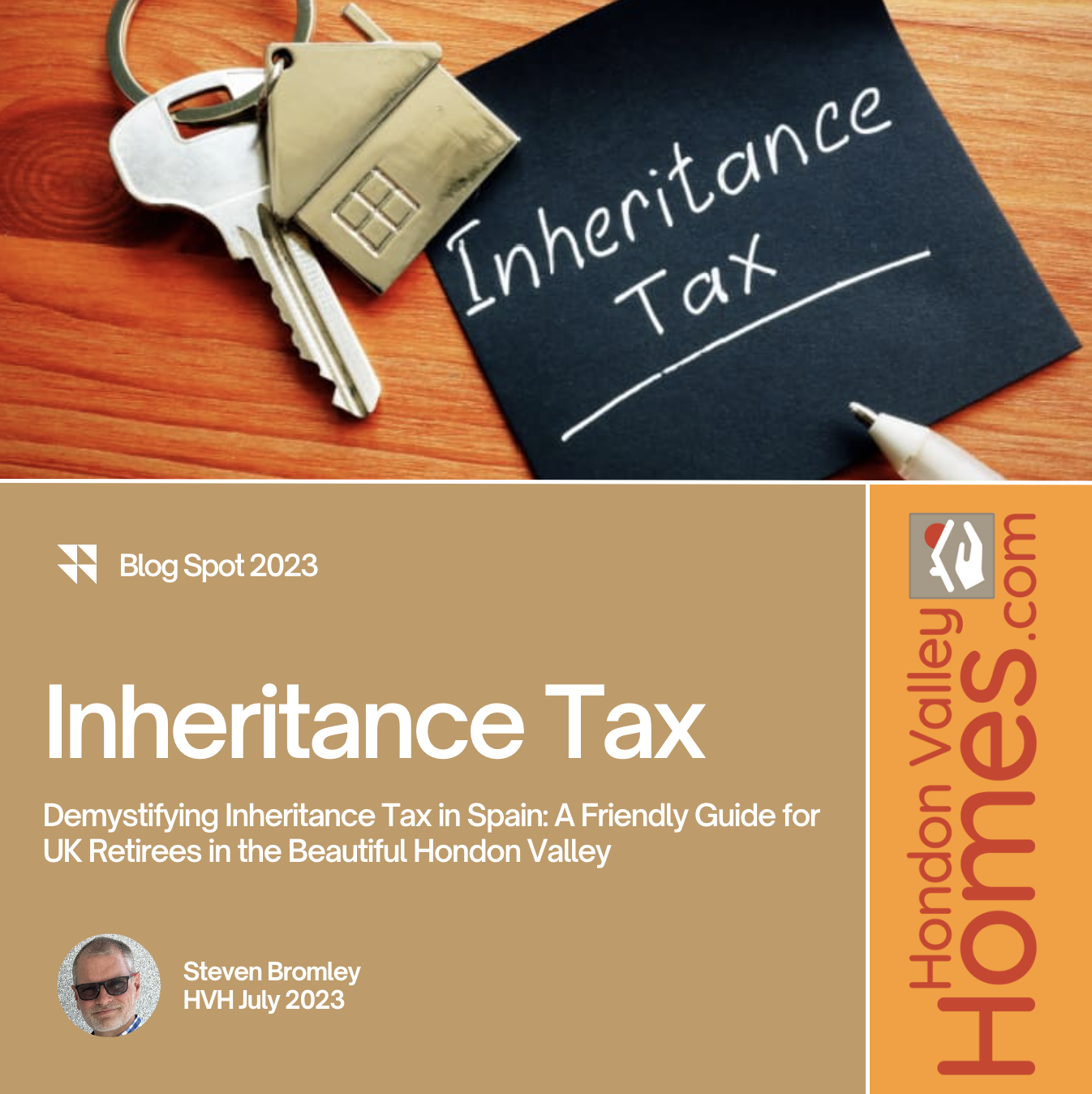Expert Advice
Knowledge Base 19 – Demystifying Inheritance Tax in Spain: A Friendly Guide for UK Retirees in the Beautiful Hondon Valley


Unlocking the Secrets of Inheritance Tax in Spain: Essential Guide for UK Retirees in the Enchanting Hondon Valley.
Welcome to the beautiful Hondon Valley, where retirees from the UK have found their perfect haven in Spain. As a knowledgeable real estate agent with 17 years of experience in this idyllic region, I understand that one of the important considerations for UK clients who have retired to Spain is the implications of inheritance tax.
In this article written with the assistance of our lawyers, I will provide you with friendly and informative insights into calculating inheritance tax in Spain and how to lower the tax rate for yourself.
When you inherit a property in Spain, it’s highly likely that you will need to pay inheritance tax. This tax is based on the value of the inherited property and its location. Let’s delve into the details!
To calculate your inheritance tax in Spain, you will need the following information:
- The value of the property.
- The family relationship between the heir and the deceased.
- The inheritance tax rates applicable in the region where the inheritance was received.
The amount of tax you pay varies depending on the location of the property. Additionally, the value fluctuates based on the Spanish autonomous region where the property is situated. Spain is composed of many autonomous regions and communities, each with its own approach to taxation. Consequently, navigating the realm of taxation in Spain can be quite challenging.
It’s important to note that you must pay inheritance tax even if you do not inherit the entire property. For instance, if your parents leave you a house and you rent out a portion of it, you will still be liable to pay inheritance tax based on the property’s value, even if you do not immediately take ownership of it.
When compared to many European Union countries, both the Spanish federal and regional governments impose higher inheritance tax rates. For example, if you inherit a property in France, you won’t have to pay inheritance tax. However, if you inherit a property in Spain, you will be subject to inheritance tax, which can reach as high as 32% of the estate’s value. Keep in mind that this tax is in addition to other assets owned by your deceased relative.
Suppose you’re planning to leave a Spanish property in your will. In that case, it’s crucial to understand the inheritance tax implications in Spain to effectively plan your estate. You’ll need to determine whether it’s more beneficial to leave the property to your family members or sell it to cover the tax.
The Spanish government calculates inheritance tax based on the property’s value and other assets owned by the deceased individual. These additional assets may include other real estate, bank accounts, insurance policies, pension plans, and investments.
So, how does inheritance tax work in Spain? Once the tax is calculated, it functions similarly to any other tax. The first step is to determine the event that triggers the accrual of the tax, which depends on the tax residency of the recipient:
- If the recipient is a Spanish tax resident, inheritance tax is applicable regardless of the property’s location.
- If the recipient is not a Spanish tax resident, inheritance tax is only paid if the property is located in Spain.
- The inheritance tax return must be submitted within six months of the deceased person’s passing.
Once the return is filed, you’ll need to determine the inheritance value based on the property’s “actual value.” Afterward, you can deduct any debts and mortgages associated with the property from the taxable value.
Certain regions offer additional reductions on the taxable base. These deductions depend on the family relationship with the deceased or the type of property. For example, if the deceased’s spouse inherits their habitual residence, the taxable amount for inheritance tax can be reduced by up to 95%. However, specific requirements must be met to avail of this reduction.
Let’s illustrate an example. Suppose you inherited a property worth €500,000 from your deceased parent. The value of the property, your relationship with the deceased, and the inheritance tax rates in the specific autonomous region where the property is located will all impact the amount of inheritance tax you need to pay.
Now, you might be wondering how much inheritance tax you could potentially pay in Spain. Once the property’s taxable value is determined, the corresponding inheritance rates will apply. The government divides the value into brackets and applies progressive tax rates. The higher the value bracket, the higher the tax rate. Please note that the specific rates vary across different regions. For instance, in Catalonia, the tax rate for the value bracket above €800,000 can reach up to 31% of the property’s taxable value.
However, it’s important to highlight that there are tax breaks available. Most regions reduce the tax liability by 99% if the heir is the child or spouse of the deceased. This means you would only need to pay 1% of the tax liability. Furthermore, if you have already paid taxes in another country on the inheritance received, you can reduce your Spanish inheritance tax liability with the taxes already paid abroad, within certain limits.
It’s worth noting that many regions in Spain offer tax allowances that vary depending on the family relationship between the heir and the deceased. For example, spouses and children may be entitled to a higher tax-free allowance compared to other relatives or unrelated beneficiaries. It’s essential to be aware of these specific allowances for different family relationships, such as spouses, children, parents, siblings, and other relatives.
In conclusion, understanding the implications of inheritance tax in Spain is vital for UK clients who have retired to this enchanting country. By considering factors such as the property’s value, location, and family relationship with the deceased, you can calculate your inheritance tax liability. Additionally, exploring tax breaks and allowances can help reduce the overall tax burden.
If you have further inquiries or need personalized guidance regarding inheritance tax in Spain, don’t hesitate to reach out to me. As your trusted real estate agent in the Hondon Valley, I am here to assist you every step of the way.
Inheritance tax is a complex and somewhat confusing topic, that often needs to be accommodated at a time when ones thoughts are elsewhere. As with any similar issue we always advise the use of a qualified lawyer or gestor in order to sort your affairs as quickly, efficiently and as stress free as possible.
eMail: [email protected]
Web: www.HondonValleyHomes.com
WhatsApp: https://wa.me/message/GBKYDT5YFKXLE1
⇈⇈⇈⇈⇈⇈⇈⇈⇈⇈⇈⇈⇈⇈⇈⇈⇈⇈⇈⇈⇈⇈⇈⇈⇈⇈⇈⇈⇈⇈⇈⇈⇈
Social Media.
Facebook: https://www.facebook.com/hondonvalleyhomes
Instagram: https://www.instagram.com/hondonvalleyhomes/
Youtube: https://www.youtube.com/c/StevenatHondonValleyHomes
Our website is full of useful information for buyers and sellers alike. We have information and advice videos, free to download eBooks as well as blogs and articles to educate our buyers and sellers so they make the most informed decisions.
Buyers Videos: https://hondonvalleyhomes.com/category/for-buyers/
Buyers ebooks: https://hondonvalleyhomes.com/free-buyers-guide/
Buyers FAQ: https://hondonvalleyhomes.com/faq_categories/buyers-faq/
Sellers Videos: https://hondonvalleyhomes.com/category/for-sellers/
Sellers eBooks: https://hondonvalleyhomes.com/free-sellers-guide/
Sellers FAQ: https://hondonvalleyhomes.com/faq_categories/sellers-faq/
#hondonvalleyhomes
#reasonstoliveinspain


 FR
FR ES
ES NL
NL DE
DE NO
NO PL
PL




